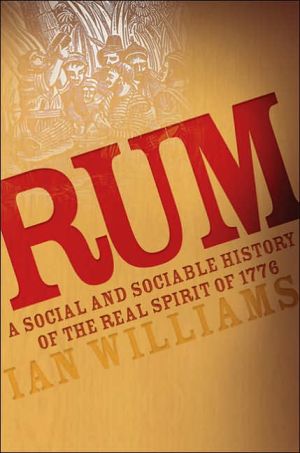Rum: A Social and Sociable History of the Real Spirit of 1776
Ian Williams describes in captivating detail how Rum and the molasses that it was made from was to the 18th century what oil is today. Rum was used by the colonists to clear Native American tribes and to buy slaves. To make it, they regularly traded with the enemy French during the Seven Years' War, angering their British masters and setting themselves on the road to Revolution. The regular flow of rum was essential to keeping both armies in the field since soldiers relied on rum to keep up...
Search in google:
Ian Williams describes in captivating detail how Rum and the molasses that it was made from was to the 18th century what oil is today.Rum was used by the colonists to clear Native American tribes and to buy slaves. To make it, they regularly traded with the enemy French during the Seven Years' War, angering their British masters and setting themselves on the road to Revolution. The regular flow of rum was essential to keeping both armies in the field since soldiers relied on rum to keep up their fighting spirits.Even though the Puritans themselves were fond of rum in quantities that would appall modern day doctors, temperance and Prohibition have obscured the historical role of the "Global Spirit with its warm heart in the Caribbean." Ian Williams' book triumphantly restores rum's rightful place in history, taking us across space and time, from its origins in the plantations of Barbados through Puritan and Revolutionary New England, to voodoo rites in modern Haiti, where to mix rum with Coke risks invoking the wrath of the god, and across the Florida straits where Fidel and the Bacardi family are still fighting over the rights for the ingredients of Cuba Libre. Publishers Weekly The Nation's Williams (Deserter: Bush's War on Military Families) offers a spirited-if rambling-discussion of the history and spread of rum, from the field-side stills of 17th-century Barbados to the scientifically calibrated factories of modern multinationals like Bacardi. His main point? That the "role of rum and drink in both causing and effecting the American Revolution has been filtered out" of our history books. Williams details the mechanics of the pre-Revolutionary triangles of trade: African slaves for the Caribbean sugarcane plantations were purchased with rum distilled in New England from Caribbean molasses. He deftly describes how the American colonists evaded British taxation of rum-making supplies, and relishes the notion of our patriotic forefathers as a bunch of rum-sozzled smugglers. His other discussions-on the use of rum rations by various countries' navies, the production of rum in other parts of the world, the efficacy of Prohibition and his own rum-tasting forays-are less focused. Readers also may tire of Williams's tendency to overwork the liquor metaphor: "cultural alembic," "heady cocktail," "good spirits," "the equation in a small tot," etc. 10 pages of b&w illus. not seen by PW. Agent, Colin Campbell. (Sept.) Copyright 2005 Reed Business Information.
\ Publishers WeeklyThe Nation's Williams (Deserter: Bush's War on Military Families) offers a spirited-if rambling-discussion of the history and spread of rum, from the field-side stills of 17th-century Barbados to the scientifically calibrated factories of modern multinationals like Bacardi. His main point? That the "role of rum and drink in both causing and effecting the American Revolution has been filtered out" of our history books. Williams details the mechanics of the pre-Revolutionary triangles of trade: African slaves for the Caribbean sugarcane plantations were purchased with rum distilled in New England from Caribbean molasses. He deftly describes how the American colonists evaded British taxation of rum-making supplies, and relishes the notion of our patriotic forefathers as a bunch of rum-sozzled smugglers. His other discussions-on the use of rum rations by various countries' navies, the production of rum in other parts of the world, the efficacy of Prohibition and his own rum-tasting forays-are less focused. Readers also may tire of Williams's tendency to overwork the liquor metaphor: "cultural alembic," "heady cocktail," "good spirits," "the equation in a small tot," etc. 10 pages of b&w illus. not seen by PW. Agent, Colin Campbell. (Sept.) Copyright 2005 Reed Business Information.\ \ \ \ \ Kirkus ReviewsAll about the distilled spirit that fueled the slave trade and sparked the American Revolution. Nation correspondent Williams, author of foodstuff histories Salt (2001) and Spice (2004), documents the etymological origins of rum-"kill-devil" is one especially pungent early name for the stuff. In the Caribbean, especially Barbados, massive plantations grew the bulk of the cane that could be transformed into what the English for a time called "Barbados Waters." The brutal work of sugar production required untold numbers of slaves, a vital component of 18th-century trading among Africa, the Caribbean and the New England colonies. Williams highlights just how lucrative and corrupting the business was, comparing the colonial-era Caribbean to today's petroleum-enriched Middle East. He ascribes to the rum business the origins of the French-Indian War and the American Revolution. During the 1760s, colonists smuggled one barrel of rum for every two that were legally taxed, and their desire for cheap liquor whipped up plenty of anti-Crown sentiment. The story becomes less colorful as it comes closer to modern times: Life at sea just isn't as much fun once British and American navies stop issuing grog rations; and the consolidating efforts of substandard producers like Bacardi are hardly as interesting, though arguably less reprehensible, than the activities of those who sold "the rum that was made from the molasses that had been traded for cod . . . then bartered in West Africa for yet more slaves." Nonetheless, Williams (himself an avid collector of rumabilia) keeps his narrative chatty and informative to the end. Rambunctious, rollicking history, sodden with tasty lore.\ \








